 |
| |
| Goals and Targets |
The Millennium Development Goals are an ambitious agenda for reducing
poverty and improving lives, agreed on by world leaders at the
Millennium Summit in September 2000. For each goal one or more targets
have been set, most for 2015, using 1990 as a benchmark.
|
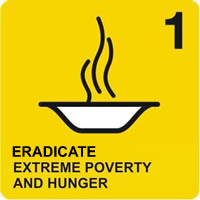 1. Eradicate extreme poverty and hunger 1. Eradicate extreme poverty and hunger
Target for 2015: Halve the proportion of people living on less than a
dollar a day and those who suffer from hunger.
More than one billion people still live on less than US$1.00 per day:
sub-Saharan Africa, Latin America and the Caribbean, and parts of Europe
and Central Asia are falling short of the poverty eradication target.
For more information on
Goal 1:
CLICK HERE!
|
| |
 2. Achieve universal primary education 2. Achieve universal primary education
Target for 2015: Ensure that all boys and girls complete primary
school.
As many as 113 million children do not attend school, but the target is
within reach. India, for example, should have 95 per cent of its children
in school by 2005. For
more information on Goal 2:
CLICK HERE!
|
| |
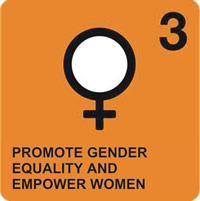 3. Promote gender equality and empower women 3. Promote gender equality and empower women
Target for 2005 and 2015: Eliminate gender disparities in primary and
secondary education preferably by 2005, and at all levels by 2015.
Two-thirds of illiterate people are women, and the rate of employment
among women is two-thirds that of men. The proportion of seats held by
women in parliaments is increasing, reaching about one-third in
Argentina, Mozambique, and South Africa.
For more information
on Goal 3:
CLICK HERE!
|
| |
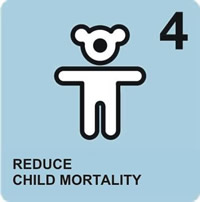 4. Reduce child mortality 4. Reduce child mortality
Target for 2015: Reduce by two-thirds the mortality rate among children
under five.
Every year nearly 11 million young people children die before their
fifth birthday, mainly from preventable illnesses, but that number is
down from 15 million in 1980.
For more information
on Goal 4:
CLICK HERE!
|
| |
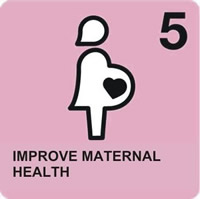 5. Improve maternal health 5. Improve maternal health
Target for 2015: Reduce by three-quarters the ratio of women dying in
childbirth.
In the developing world, the risk of dying in childbirth is one in 48,
but virtually all countries now have safe motherhood programs.
For more information on Goal
5:
CLICK HERE!
|
| |
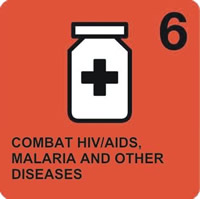 6. Combat HIV/AIDS, malaria, and other diseases 6. Combat HIV/AIDS, malaria, and other diseases
Target for 2015: Halt and begin to reverse the spread of HIV/AIDS and
the incidence of malaria and other major diseases.
Forty million people are living with HIV, including five million
newly infected in 2003. Countries like Brazil, Senegal, Thailand, and
Uganda have shown that the spread of HIV can be stemmed.
For more information
on Goal 6:
CLICK HERE!
|
| |
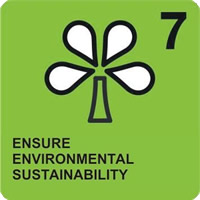 7. Ensure environmental sustainability 7. Ensure environmental sustainability
Targets:
+ Integrate the principles of sustainable development into country
policies and programs and reverse the loss of environmental resources.
+ By 2015, reduce by half the proportion of people without access to
safe drinking water.
+ By 2020, achieve significant improvement in the lives of at least 100
million slum dwellers.
More than one billion people lack access to safe drinking water and
more than two billion lack sanitation. During the 1990's, however,
nearly one billion people gained access to safe water and the same
number to sanitation.
For more information
on Goal 7:
CLICK HERE!
|
| |
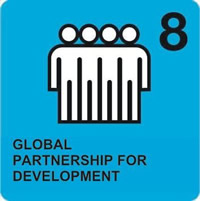 8. Develop a global partnership for development 8. Develop a global partnership for development
Targets:
+ Develop further an open trading and financial system that includes a
commitment to good governance, development and poverty reduction--
nationality and internationally.
+ Address the least developed countries' special needs, and the special
needs of landlocked and small island developing states.
+ Deal comprehensively with developing countries' debt problems.
+ Develop decent and productive work for youth.
+ In cooperation with pharmaceutical companies, provide access to
affordable essential drugs in developing countries.
+ In cooperation with the private sector, make available the benefits
of new technologies-- especially information and communications
technologies.
Many developing countries spend more on debt service than on social
services. New aid commitments made in the first half of 2002 could mean an
additional US$12 billion per year by 2006.
For more information on Goal
8:
CLICK HERE!
|
| |

